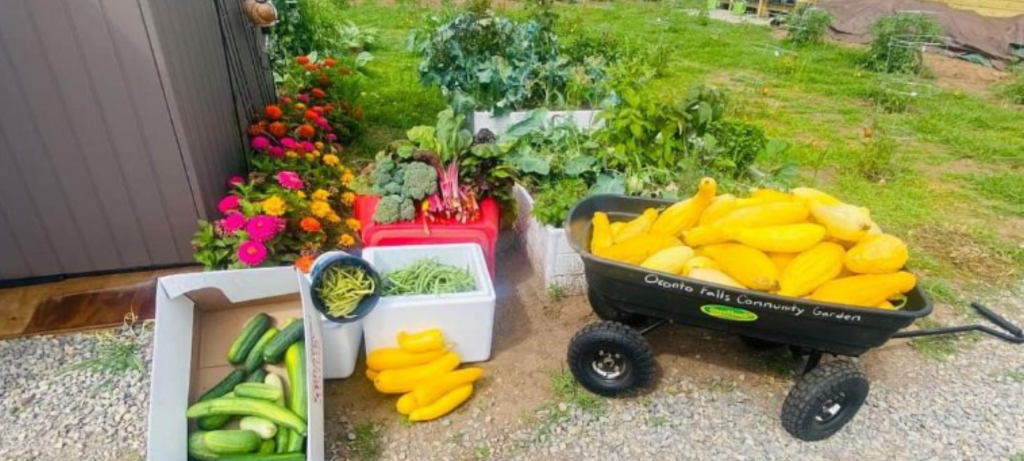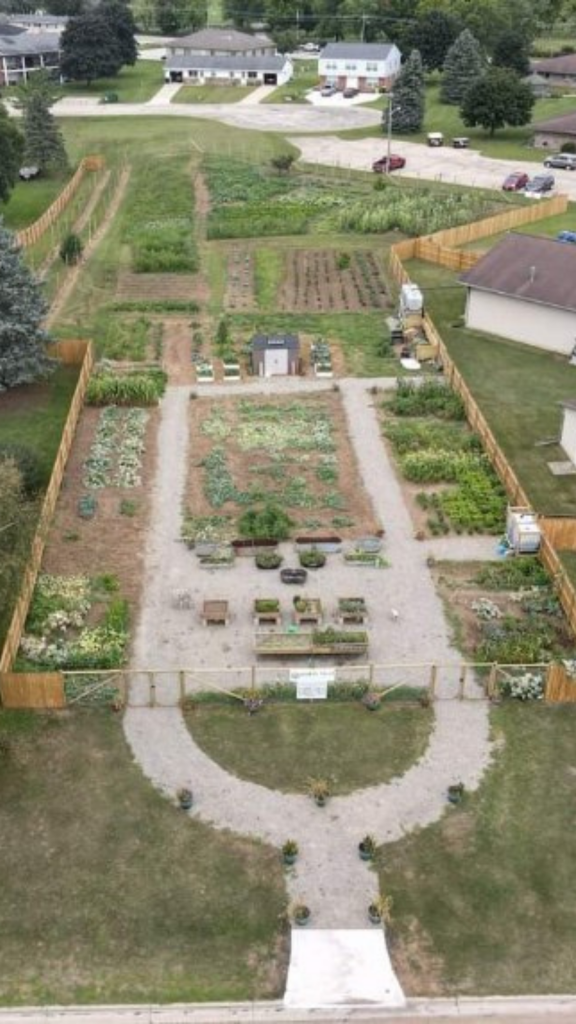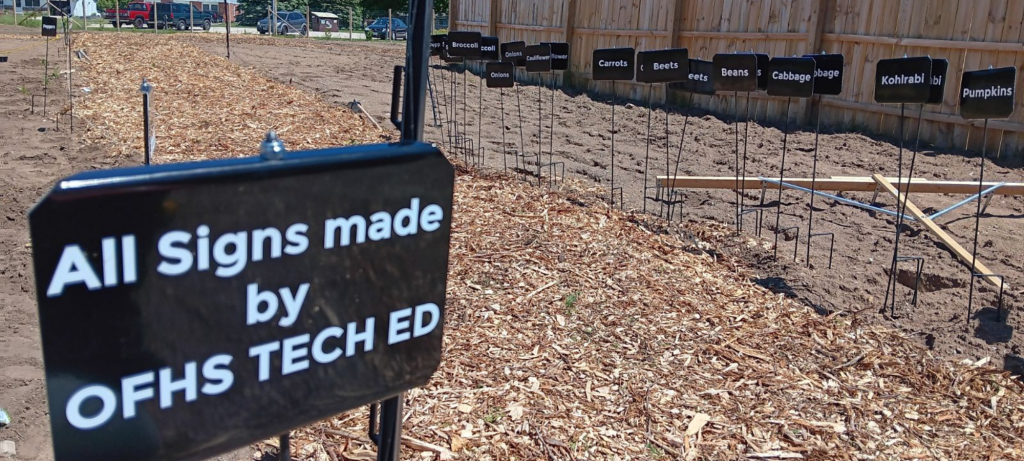Access to healthy food is challenging in rural areas, and many Wisconsin families struggle to afford healthy food on a limited budget. As food prices increase, more families are turning to emergency food providers, like food pantries, to help put food on the table. Emergency food providers also face challenges in procuring food, particularly healthier options such as fresh and shelf-stable fruits and vegetables, whole grains, and dairy products.
To reduce barriers to accessing healthy foods, UW–Madison Extension’s FoodWIse educators worked with local partners to create the Oconto Falls Community Garden, which supplies a local food pantry and other food distribution programs with fresh produce.

“Without the community garden, we only get weeks-old leftover produce from Walmart,” said Don Hille, a volunteer at the Kingdom Come Food Pantry in Oconto Falls.
In 2024, the community garden group delivered over 4,500 pounds of produce to the pantry’s 400-500 families that visit each week. “While I am giving away produce from the garden on pantry days, I hear lots of good responses and great reviews from the patrons of KC food pantry who receive the produce. They are constantly asking where we get all the fresh produce from,” said Hille.
For over 30 years, the Extension FoodWIse program has worked to improve access to affordable and healthy foods in communities throughout Wisconsin. FoodWIse is supported by the federal SNAP-Ed program, the funding for which was eliminated in the recent congressional reconciliation bill and takes effect Sept. 30, 2025. The Oconto Falls project is an example of the type of work that FoodWIse educators will no longer be able to provide to communities all across Wisconsin.
Fostering support
FoodWIse educator Sarah Schindel has been part of the garden, serving as an Extension educator and a board member, since the beginning more than three years ago. She has worked with local businesses and organizations to build a strong group of supporters who are invested in the garden’s success. Those partnerships have led to funding to expand the garden and volunteers to tend the plants, so more food can be donated to local food pantries.
A large boost to the garden’s infrastructure came in 2022 when a community member approached her about a grant opportunity available through the Lumberjack Resource Conservation & Development (RC&D) Council. Schindel worked closely with the Oconto County Land and Water Department to write the grant, secure matching funds, collect letters of support from the community, and present the idea to multiple groups. The Lumberjack RC&D Council awarded the garden $10,000 to install paved walkways and a learning pavilion within the garden. Having additional infrastructure made the garden more accessible to community members.
The Oconto Falls Garden has provided Schindel with opportunities for working with families and youth. Last year, FoodWIse offered “Read for Health,” a class for young children. Participants read a book that talked about fruits and vegetables, and then went on a search to find the produce mentioned in the garden. The program received additional support from the Nurses Nook, a local partner that connected Schindel to a local daycare that wanted to incorporate nutrition education into its programs.

Bringing people together
In addition to teaching families about healthy living, FoodWIse works within communities to make healthy choices easier and more accessible for everyone. Health is more than personal choices, it is also shaped by where people live, learn, work, and play. When the easy choice is also the healthy choice, families are more likely to eat nutritious foods and have active lifestyles.
Last year, FoodWIse educators reached over 133,000 people with nutrition education and community-based strategies to support healthy eating and active lifestyles – partnering with local schools, food pantries, farmers markets, and community centers to engage children, families, and seniors.

For the Oconto Falls Garden, the program is successful because of the partnerships formed. Volunteers of all ages have participated, including people from the Willing Workers 4-H Club, Kingdom Come Food Pantry, the ambulance service, Nurse’s Nook, Grace Lutheran Church, NEW Credit Union, New View Industries, the Oconto Falls Lioness Club, Oconto Falls High School agricultural classes, Newcap, and the Oconto Falls FFA Alumni. Schindel says that the volunteers have made the difference in having a successful and sustainable garden. “They planted, nurtured, and harvested the produce, developed and built fences and raised beds, and recruited local businesses to be sponsors. Local businesses donated funds and encouraged their employees to volunteer,” said Schindel.
Bringing University resources to rural communities
FoodWIse educators partner with communities to assess the local barriers that SNAP recipients face in buying healthy food and accessing opportunities for physical activity. When University resources or expertise can help, they connect local partners to campus opportunities.
To strengthen the community garden, FoodWIse connected the Oconto Falls Community Garden planning committee with UW-Madison’s Law & Entrepreneurship Clinic Legal Services team to help them obtain 501(c)(3) status. The nonprofit status will allow the Oconto Falls Community Garden to apply for grants, access government programs, accept tax-deductible donations, make purchases tax-free, and access discounts.
While Schindel gives accolades to all of the partners who helped make the garden a reality, her leadership and commitment to making healthy food more accessible were a large part of the program’s success. Bringing together volunteers, donors, and businesses helped create a sustainable system that will continue to provide residents with fresh potatoes, cucumbers, peppers, tomatoes, and more. That equates to increased food security for local families and a more connected and resilient local food system.
FoodWIse has supported garden projects across the state, including its Growing Together projects. Since 2017, the Growing Together team has implemented community and donation garden projects across 37 counties, reaching 42,605 residents with limited resources with 33,110 pounds of fresh produce and delivering nutrition education to 3,203 individuals. Additionally, the project has leveraged over $86,000 in donated materials, in-kind donations, and other funding to support these garden efforts.
Note: FoodWIse is funded by the SNAP National Nutrition Education and Obesity Prevention Program (“SNAP-Ed”). Funding for that program ends September 30, 2025.



